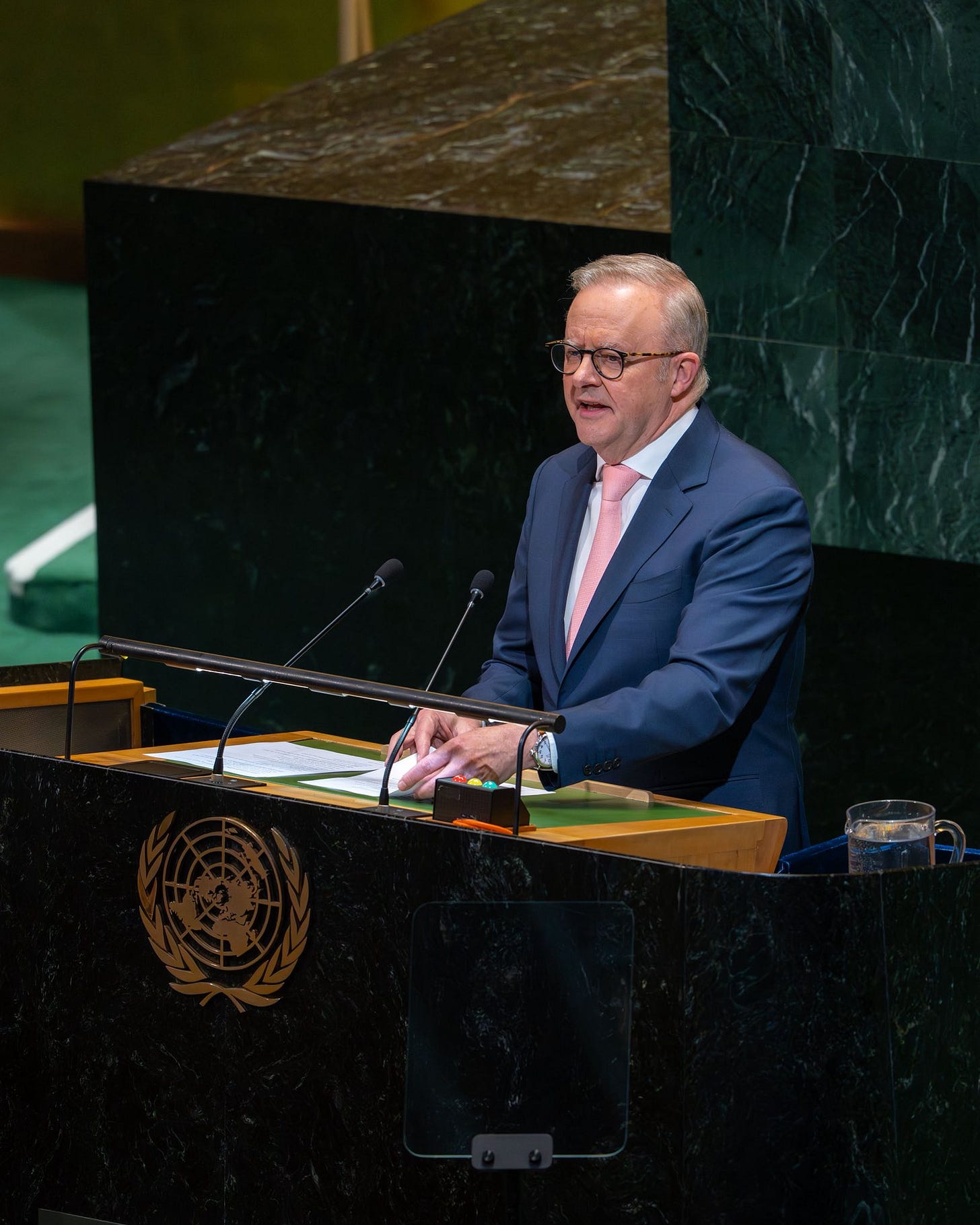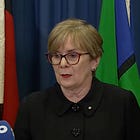Albanese Criticizes Israel at UN Summit as Opposition Promises to Reverse Palestinian Recognition
Today’s Article is brought to you by Empower your podcasting vision with a suite of creative solutions at your fingertips.
This piece is freely available to read. Become a paid subscriber today and help keep Mencari News financially afloat so that we can continue to pay our writers for their insight and expertise.
Prime Minister Anthony Albanese told world leaders Tuesday that Israel must accept responsibility for Gaza's humanitarian crisis, while opposition leader Susan Lee sparked controversy by writing to U.S. Republicans promising a coalition government would withdraw Australia's recognition of a Palestinian state.
Speaking at a summit on Palestinian statehood on the sidelines of the United Nations General Assembly in New York, Albanese delivered some of his strongest criticism yet of Israeli actions in Gaza, warning that current policies risk making a two-state solution impossible.
"Right now, Gaza is in the grip of a humanitarian catastrophe, and the Israeli government must accept its share of responsibility," Albanese said. "Tens of thousands of civilians have been killed. Desperate people, including children, denied vital aid."
The prime minister's remarks came as France and Saudi Arabia presented a phased plan to end the conflict by establishing a demilitarized Palestinian state governed by the Palestinian Authority with international assistance.
Albanese cited the killing of Australian aid worker Zomi Frankem among his concerns, alongside continued settlement expansion in the West Bank and increased settler violence.
"This comes alongside the continued illegal expansion of settlements on the West Bank and an increase in settler violence," he said. "Threats to annex parts of Palestine and permanently displace the Palestinian people. Such conduct risks putting a two-state solution beyond reach."
Truth matters. Quality journalism costs.
Your subscription to Mencari directly funds the investigative reporting our democracy needs. For less than a coffee per week, you enable our journalists to uncover stories that powerful interests would rather keep hidden. There is no corporate influence involved. No compromises. Just honest journalism when we need it most.
Not ready to be paid subscribe, but appreciate the newsletter ? Grab us a beer or snag the exclusive ad spot at the top of next week's newsletter.
Domestic Political Controversy
Back in Australia, the prime minister's international diplomacy faced domestic pushback as opposition leader Sussan Ley took the unusual step of writing directly to U.S. Republicans to undermine the government's foreign policy position.
Foreign Minister Penny Wong accused the opposition of conducting "rogue foreign policy" that works against Australia's national interests by promising to reverse Palestinian recognition if elected.
"The opposition of Australia running a rogue foreign policy is not in the nation's interests," Wong said. "We are Australia's strongest when our country speaks with one voice, and I think Australians know that, and it is a pity that Susan Lee does not."
Wong defended the government's recognition of Palestinian statehood as essential for achieving Middle East peace, directly contradicting the opposition's position that such recognition rewards extremism.
Palestinian Officials Denied U.S. Visas
The summit took place without Palestinian Authority representation after the United States denied visas to Palestinian officials seeking to attend the UN General Assembly, highlighting ongoing diplomatic obstacles facing Palestinian statehood efforts.
Dr. Vaazan Agarbekian-Shahin, Palestinian State Minister for Foreign Affairs, expressed frustration about the exclusion during an ABC Afternoon Briefing interview from Ramallah.
"This was a historic moment and we would have loved to be joining the meeting in New York and celebrating this historic moment," she said. "We have long-waited for such a moment, and we should have been there."
Despite the absence, Agarbekian-Shahin described the recognition efforts as legally and morally significant for Palestinians' right to self-determination.
"Recognition is long overdue," she said. "Recognitions strengthen the legal position of the state of Palestine. They are a legal, moral and ethical reward for Palestinians. It's the right to have a state of their own."
Palestinian Authority Commitments
The Palestinian official addressed criticism that recognition rewards Hamas following its October 7 attacks, arguing that non-recognition actually benefits extremists opposed to a two-state solution.
"It's a reward to the plight of the Palestinian people and to the right under international law," Agarbekian-Shahin said. "Non-recognition is a reward to the extremists who do not want the two-state solution."
She outlined Palestinian Authority commitments made to secure international recognition, including governance reforms and promises to hold democratic elections.
"We are committed to elections. We are committed to democratization. We are committed to improving and developing best practices in our institutions," she said, quoting Palestinian President Mahmoud Abbas's letter to world leaders.
Elections would occur within one year of a permanent ceasefire, she said, noting current impossibility due to ongoing conflict in Gaza and Israeli restrictions on East Jerusalem Palestinians.
"Elections will take place, as specified by the president, once the aggression on Gaza stops and we have a permanent ceasefire," Agarbekian-Shahin said. "And then within a year, we will have elections on the entirety of Palestine."
Reform Progress Reports
The Palestinian Authority has already begun implementing governance reforms promised to recognizing nations, according to Agarbekian-Shahin, who said progress reports are regularly submitted to international partners.
"The reform is already starting, and we've moved a long way, and we present progress reports every once in a while," she said. "I can assure you very confidently that we have met most of the milestones in whatever we set to do. And in fact, we have surpassed most of the milestones."
The reform pathway has received significant input from Arab Gulf states and the French government, she noted, reflecting broader international coordination on Palestinian statehood efforts.
Diplomatic Obstacles Continue
Israel's blocking of diplomatic representatives to Palestinian territories continues creating obstacles for international engagement, with Australia's representative to Palestine in Ramallah denied a visa preventing her return, alongside similar restrictions on Norwegian representatives.
"This will further isolate the state of Israel, because this is also against the international norm," Agarbekian-Shahin said. "What we want is for all representative offices to be functioning in the state of Palestine today more than ever."
She expressed hope that recent recognitions would help pressure Israel to allow diplomatic access, while emphasizing flexibility on aid delivery mechanisms.
"I think we should explore all avenues, but in the final analysis, what is most important is to get the aid in," she said regarding bilateral versus multilateral assistance channels.
Arab Unity and Support
The Palestinian minister praised Arab nations' unified approach to the crisis while acknowledging desires for additional support given Gaza's ongoing suffering.
"I think today the Arabs are more united than ever, and they are collectively working very diligently on Palestine in general, the peace process, the New York conference," she said.
Egypt's border position with Gaza drew particular attention regarding aid access, though Agarbekian-Shahin defended Egyptian efforts while noting Israeli impediments.
"Egypt is doing a lot and has been doing a lot for decades," she said. "What is needed is to work on the Israeli side, because the impediments are from the Israeli side."
International Pressure Strategy
Recognition by multiple nations aims to increase pressure on Israel through legal, political and economic commitments that accompany formal statehood acknowledgment, according to Palestinian officials.
"With recognition come commitments related to political, legal, economic, dealings with the state of Israel, and the more pressure is put on the state of Israel, the more it will need to rethink of how it is positioning itself in the region," Agarbekian-Shahin said.
The summit occurred as both Israeli and Hamas positions have appeared to harden, though Palestinian officials argue recognition creates new diplomatic leverage for peace efforts rather than rewarding extremism.
The controversy over Australian opposition outreach to U.S. Republicans reflects broader international divisions over Palestinian recognition timing and effectiveness as a peace strategy.
Sustaining Mencari Requires Your Support
Independent journalism costs money. Help us continue delivering in-depth investigations and unfiltered commentary on the world's real stories. Your financial contribution enables thorough investigative work and thoughtful analysis, all supported by a dedicated community committed to accuracy and transparency.
Subscribe today to unlock our full archive of investigative reporting and fearless analysis. Subscribing to independent media outlets represents more than just information consumption—it embodies a commitment to factual reporting.
As well as knowing you’re keeping Mencari (Australia) alive, you’ll also get:
Get breaking news AS IT HAPPENS - Gain instant access to our real-time coverage and analysis when major stories break, keeping you ahead of the curve
Unlock our COMPLETE content library - Enjoy unlimited access to every newsletter, podcast episode, and exclusive archive—all seamlessly available in your favorite podcast apps.
Join the conversation that matters - Be part of our vibrant community with full commenting privileges on all content, directly supporting The Evening Post (Australia)
Catch up on some of Mencari’s recent stories:
It only takes a minute to help us investigate fearlessly and expose lies and wrongdoing to hold power accountable. Thanks!







